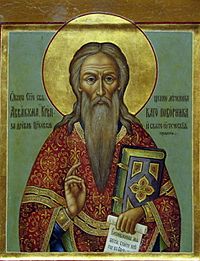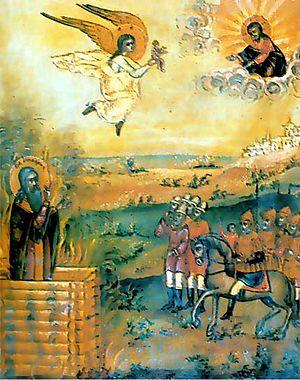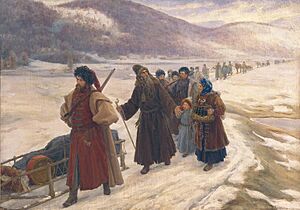Avvakum facts for kids
Quick facts for kids Avvakum Petrov |
|
|---|---|
 |
|
| Great Martyr | |
| Born | 20 November 1620/21 Grigorovo, Nizhny Novgorod |
| Died | 14 April 1682 (aged 60 or 61) Pustozyorsk |
| Venerated in | Old Believers (Russian Orthodox Old-Rite Church) |
| Major shrine | Pustozyorsk, Russia |
| Feast | Repose: 14 April |
| Attributes | Dressed in a priest's robes, holding the two-fingered sign of the cross |
| Patronage | Russia |
Avvakum Petrov (Russian: Аввакум Петров; 20 November 1620/21 – 14 April 1682) was an important Russian religious leader. He was a priest, known as a protopope, at the Kazan Cathedral in Moscow. Avvakum led a group called the Old Believers. They strongly disagreed with changes made to the Russian Orthodox Church by Patriarch Nikon. Avvakum's own story, written by himself, and his letters are considered important writings from that time.
Contents
Why Avvakum Disagreed with Church Changes
Avvakum was born in Grigorovo, in what is now the Nizhny Novgorod Oblast region of Russia. In 1652, Patriarch Nikon, the head of the Russian Church, started making many changes. These changes were about how church services were done (called liturgy) and what the church believed (called theology).
The main goal of these changes was to make the Russian Church more similar to other Christian churches in Eastern Europe. However, Avvakum and many others strongly disagreed with these new rules. They believed these changes were wrong and would harm the true Russian Church. They thought the Russian Church was the only true Church of God. Avvakum even argued that other churches had fallen into error because of similar beliefs and practices.
Avvakum's Exile and Final Years
Because Avvakum opposed the church reforms, he was put in prison many times. First, he was sent away to Siberia, to a city called Tobolsk. He even joined an exploration trip towards the Chinese border.
In 1664, after Patriarch Nikon was no longer in charge, Avvakum was allowed to return to Moscow. But he was soon sent away again to Mezen, a town in the far north. He was allowed to return to Moscow one more time for a big Church meeting in 1666–67. However, he continued to speak out against the reforms.
Because of his strong opposition, he was exiled again in 1667. This time, he was sent to Pustozyorsk, a very remote place above the Arctic Circle. For the last fourteen years of his life, he was kept prisoner there in a small, sunken hut. In 1682, Avvakum and his followers were executed by being burned. A special wooden cross now marks the place where he died.
Avvakum's Writings
Avvakum wrote his own life story, which is very famous. In it, he describes the difficult times he faced while imprisoned and exiled in the Russian Far East. He also wrote about his friendship and later disagreement with Tsar Alexis. His writings also mention his belief in driving out evil spirits and his great love for nature and God's creations. Many handwritten copies of his autobiography were passed around for nearly 200 years before it was first printed in 1861.
Avvakum's Legacy
Even after Avvakum's death, groups who rejected the church changes continued to exist. These groups became known as the Old Believers. They still follow the older traditions of the Russian Orthodox Church today.
See also
 In Spanish: Avvakum para niños
In Spanish: Avvakum para niños



